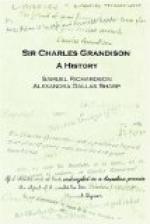She made a motion to go.
With a respectful air, I told her, she must not leave me. My motive deserved not, I said, that both she and Sir Harry should leave me in displeasure.
You know but too well, resumed she, how acceptable your officiousness (I must call it so) is to Sir Harry.
And does Sir Harry, madam, favour his son’s suit? You rejoice me: let not Mr. Beauchamp know that he does: and do you, my dear Lady Beauchamp, take the whole merit of it to yourself. How will he revere you for your goodness to him! And what an obligation, if, as you say, Sir Harry is inclined to favour him, will you, by your generous first motion, lay upon Sir Harry!
Obligation upon Sir Harry! Yes, Sir Charles Grandison, I have laid too many obligations already upon him, for his gratitude.
Lay this one more. You own you have had a misunderstanding this morning: Sir Harry is withdrawn, I suppose, with his heart full: let me, I beseech you, make up the misunderstanding. I have been happy in this way—Thus we will order it—We will desire him to walk in. I will beg your interest with him in favour of the contents of the letter I sent. His compliance will follow as an act of obligingness to you. The grace of the action will be yours. I will be answerable for Mr. Beauchamp’s gratitude.—Dear madam, hesitate not. The young gentleman must come over one day: let the favour of its being an early one, be owing entirely to you.
You are a strange man, sir: I don’t like you at all: you would persuade me out of my reason.
Let us, madam, as Mr. Beauchamp and I are already the dearest of friends, begin a family understanding. Let St. James’s-square, and Berkley-square, when you come to town, be a next-door neighbourhood. Give me the consideration of being the bondsman for the duty of Mr. Beauchamp to you, as well as to his father.
She was silent: but looked vexed and irresolute.
My sisters, madam, are amiable women. You will be pleased with them. Lord L—— is a man worthy of Sir Harry’s acquaintance. We shall want nothing, if you would think so, but Mr. Beauchamp’s presence among us.
What! I suppose you design your maiden sister for the young fellow—But if you do, sir, you must ask me for—There she stopt.
Indeed I do not. He is not at present disposed to marry. He never will without his father’s approbation, and let me say—yours. My sister is addressed to by Lord G——, and I hope will soon be married to him.
And do you say so, Sir Charles Grandison?—Why then you are a more disinterested man, than I thought you in this application to Sir Harry. I had no doubt but the young fellow was to be brought over to marry Miss Grandison; and that he was to be made worthy of her at my expense.
She enjoyed, as it seemed, by her manner of pronouncing the words young fellow, that designed contempt, which was a tacit confession of the consequence he once was of to her.




